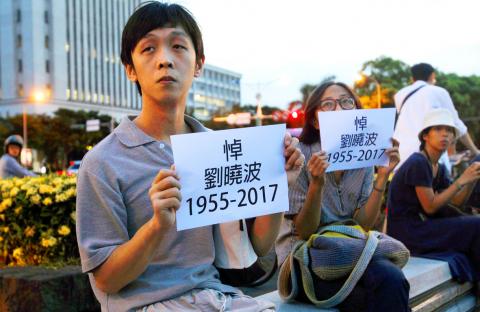A commemorative event was held in Taipei last night to mourn the passing of Chinese Nobel Peace Prize laureate Liu Xiaobo (劉曉波) as politicians stressed the importance of democracy and human rights.
Liu, sentenced to 11 years in jail in 2009 for “inciting subversion of state power” after he helped write a petition entitled Charter 08, which called for sweeping political reforms, died on Thursday after battling liver cancer. He was 61.
The commemoration, held in Liberty Square, was initiated by the New School for Democracy, an institution chaired by exiled Chinese democracy activist Wang Dan (王丹).

Photo: Chiang Ying-ying, AP
The group called for Beijing to release all those imprisoned for speaking out against the Chinese Communist Party.
Earlier, Kaohsiung Mayor Chen Chu (陳菊) said it was sad to hear of Liu’s passing, offering her condolences for Liu’s 28 years of house arrest and imprisonment, adding that “only those who have been in jail can understand.”
Chen herself served six years and two months in prison for her participation in the Formosa Incident, a pro-democracy demonstration organized by Formosa Magazine on Dec. 10, 1979.
“No one should be imprisoned for expressing a different view using any method,” she said. “Liu’s struggles and his adherence to his ideals reminds us that freedom and democracy do not fall out of the sky. Freedom and democracy cannot be retained without effort spent to safeguard it.”
Taipei Mayor Ko Wen-je (柯文哲) said that China is constantly criticized by other nations for being “barbaric” and that it should endeavor to improve its human rights record.
“Should China be willing, Taiwan is an excellent example of a success story and we hope that Chinese, one day, will enjoy freedom and democracy,” Ko said. “This is what [China] needs to work on.”
Former president Ma Ying-jeou (馬英九) wrote on Facebook that while the world mourned the passing of Liu, China should seek to improve its record on freedom and human rights, both to live up to its position as a “great power” and the “Chinese dream.”
Meanwhile, in response to President Tsai Ing-wen’s (蔡英文) remarks on Thursday that Taiwan hoped China could show self-confidence and promote political reform following the death of the Nobel laureate, Beijing yesterday accused Tsai of aggravating tension across the Taiwan Strait.
China’s Taiwan Affairs Office spokesman Ma Xiaoguang (馬曉光) was quoted by Xinhua news agency as saying that such “reckless” comments were “very dangerous” for cross-strait relations and were an example of Tsai’s “repeated arbitrary attacks.”
He said Tsai and the Democratic Progressive Party had “lifted the deceptive veil” of maintaining the “status quo” in cross-strait relations and that the repeated attacks were an attempt to regress ties to “tension and turbulence.”
“Such behavior is very dangerous,” he said, according to the Xinhua report, which was published only in English.
Additional reporting by Peng Wan-hsin and agencies

MAKING WAVES: China’s maritime militia could become a nontraditional threat in war, clogging up shipping lanes to prevent US or Japanese intervention, a report said About 1,900 Chinese ships flying flags of convenience and fishing vessels that participated in China’s military exercises around Taiwan last month and in January last year have been listed for monitoring, Coast Guard Administration (CGA) Deputy Director-General Hsieh Ching-chin (謝慶欽) said yesterday. Following amendments to the Commercial Port Act (商港法) and the Law of Ships (船舶法) last month, the CGA can designate possible berthing areas or deny ports of call for vessels suspected of loitering around areas where undersea cables can be accessed, Oceans Affairs Council Minister Kuan Bi-ling (管碧玲) said. The list of suspected ships, originally 300, had risen to about

DAREDEVIL: Honnold said it had always been a dream of his to climb Taipei 101, while a Netflix producer said the skyscraper was ‘a real icon of this country’ US climber Alex Honnold yesterday took on Taiwan’s tallest building, becoming the first person to scale Taipei 101 without a rope, harness or safety net. Hundreds of spectators gathered at the base of the 101-story skyscraper to watch Honnold, 40, embark on his daredevil feat, which was also broadcast live on Netflix. Dressed in a red T-shirt and yellow custom-made climbing shoes, Honnold swiftly moved up the southeast face of the glass and steel building. At one point, he stepped onto a platform midway up to wave down at fans and onlookers who were taking photos. People watching from inside

Japan’s strategic alliance with the US would collapse if Tokyo were to turn away from a conflict in Taiwan, Japanese Prime Minister Sanae Takaichi said yesterday, but distanced herself from previous comments that suggested a possible military response in such an event. Takaichi expressed her latest views on a nationally broadcast TV program late on Monday, where an opposition party leader criticized her for igniting tensions with China with the earlier remarks. Ties between Japan and China have sunk to the worst level in years after Takaichi said in November that a hypothetical Chinese attack on Taiwan could bring about a Japanese

A Vietnamese migrant worker yesterday won NT$12 million (US$379,627) on a Lunar New Year scratch card in Kaohsiung as part of Taiwan Lottery Co’s (台灣彩券) “NT$12 Million Grand Fortune” (1200萬大吉利) game. The man was the first top-prize winner of the new game launched on Jan. 6 to mark the Lunar New Year. Three Vietnamese migrant workers visited a Taiwan Lottery shop on Xinyue Street in Kaohsiung’s Gangshan District (崗山), a store representative said. The player bought multiple tickets and, after winning nothing, held the final lottery ticket in one hand and rubbed the store’s statue of the Maitreya Buddha’s belly with the other,